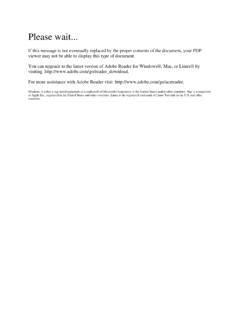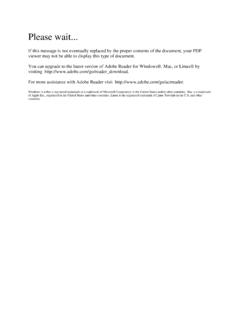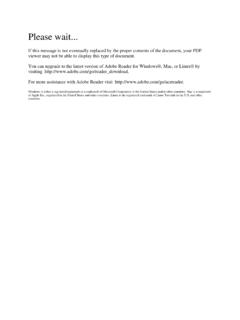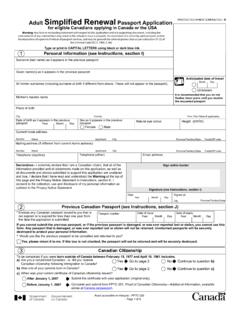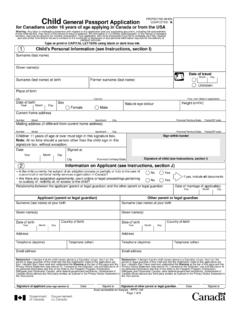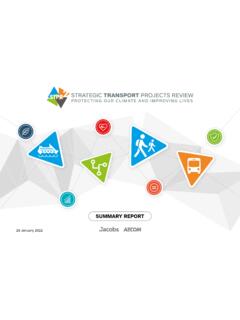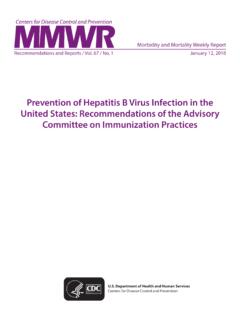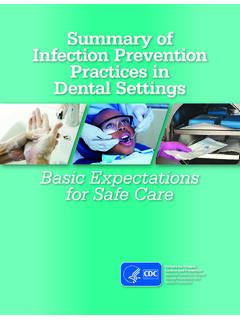Transcription of An Advisory Committee Statement (ACS) National Advisory ...
1 0 | UPDATED GUIDANCE ON COVID-19 VACCINATION TIMING FOR INDIVIDUALS PREVIOUSLY INFECTED WITH SARS-COV-2 An Advisory Committee Statement (ACS) National Advisory Committee on Immunization (NACI) Rapid response: Updated guidance on COVID-19 vaccination timing for individuals previously infected with SARS-CoV-2 Published: February 4, 2022 1 | UPDATED GUIDANCE ON COVID-19 VACCINATION TIMING FOR INDIVIDUALS PREVIOUSLY INFECTED WITH SARS-COV-2 PREAMBLE The National Advisory Committee on Immunization (NACI) is an External Advisory Body that provides the Public Health Agency of Canada (PHAC) with independent, ongoing and timely medical, scientific, and public health advice in response to questions from PHAC relating to immunization.
2 In addition to burden of disease and vaccine characteristics, PHAC has expanded the mandate of NACI to include the systematic consideration of programmatic factors in developing evidence-based recommendations to facilitate timely decision-making for publicly funded vaccine programs at provincial and territorial levels. The additional factors to be systematically considered by NACI include economics, ethics, equity, feasibility, and acceptability. Not all NACI Statements will require in-depth analyses of all programmatic factors. While systematic consideration of programmatic factors will be conducted using evidence-informed tools to identify distinct issues that could impact decision-making for recommendation development, only distinct issues identified as being specific to the vaccine or vaccine-preventable disease will be included.
3 This Statement contains NACI s independent advice and recommendations , which are based upon the best current available scientific knowledge. This document is being disseminated for information purposes. People administering the vaccine should also be aware of the contents of the relevant product monograph. recommendations for use and other information set out herein may differ from that set out in the product monographs of the Canadian manufacturers of the vaccines. Manufacturer(s) have sought approval of the vaccines and provided evidence as to its safety and efficacy only when it is used in accordance with the product monographs. NACI members and liaison members conduct themselves within the context of PHAC s Policy on Conflict of Interest, including yearly declaration of potential conflict of interest.
4 2 | UPDATED GUIDANCE ON COVID-19 VACCINATION TIMING FOR INDIVIDUALS PREVIOUSLY INFECTED WITH SARS-COV-2 INTRODUCTION Currently, infection rates across Canada are at unprecedented levels due to the highly transmissible Omicron variant, which is partially evasive to immunity conferred by COVID-19 vaccines or a previous SARS-CoV-2 infection. Due to widespread circulation of the Omicron variant, many Canadians seeking COVID-19 vaccination (for primary series or booster doses) will have a history of SARS-CoV-2 infection. While there is a paucity of evidence to inform recommendations on optimal intervals between SARS-CoV-2 infection and COVID-19 vaccination, NACI is providing updated guidance on suggested intervals based on immunological principles, the available evidence, and expert opinion.
5 This guidance may change as additional evidence emerges regarding the extent and duration of immunological protection conferred by infection with Omicron and future variants. METHODS On February 25, March 10, April 1, June 29, and November 23, 2021, and January 18, 2022, NACI reviewed available evidence on vaccine safety, immunogenicity, and effectiveness of COVID-19 vaccination (primary series and/or booster dose) with respect to previous infection, as well as ethics, equity, feasibility, and acceptability of guidance. Following a comprehensive review and discussion, NACI approved this updated guidance on COVID-19 vaccines (primary series and booster doses) for individuals with a history of previous SARS-CoV-2 infection on January 31, 2022.
6 NACI continues to review the evidence on the use of COVID-19 vaccines and will update its recommendations as needed. Details of NACI's evidence-informed recommendation development process can be found elsewhere (1, 2). recommendations NACI continues to recommend that COVID-19 vaccines should be offered to individuals with previous SARS-CoV-2 infection without contraindications to the vaccine. Updates are presented in the table below regarding the timing of vaccinations for those with recent SARS-CoV-2 infection. These are added to previous recommendations . Interim guidance on suggested intervals between previous SARS-CoV-2 infection and COVID-19 vaccination 3 | UPDATED GUIDANCE ON COVID-19 VACCINATION TIMING FOR INDIVIDUALS PREVIOUSLY INFECTED WITH SARS-COV-2 NACI acknowledges the current high incidence rate of COVID-19 in Canada and internationally, as well as the limitations of the evidence on optimal timing between COVID-19 vaccine doses (primary series and booster doses) and previous SARS-CoV-2 infection.
7 While there are insufficient clinical or real-world data at this time to inform guidance on an optimal interval between infection and subsequent vaccination, NACI has considered available data, basic principles of vaccinology and immunology, and expert opinion informed by knowledge of other viral diseases, and issued the following updated guidance on suggested intervals between previous SARS-CoV-2 infection and COVID-19 vaccination: Table 1. Suggested intervals between previous SARS-CoV-2 infectiona and COVID-19 vaccination SARS-CoV-2 infectiona timing relative to COVID-19 vaccination Population Suggested interval between SARS-CoV-2 infectiona and vaccination (clinical discretion is advised)b,c Infection prior to completion or initiationc of primary vaccination series Individuals 5 years of age and older who are not considered moderately to severely immunocompromised and with no previous history of multisystem inflammatory syndrome in children (MIS-C) Receive the vaccine 8 weeks after symptom onset or positive test (if asymptomatic)
8 B Individuals 5 years of age and older who are moderately to severely immunocompromised and with no previous history of MIS-C Receive the vaccine dose 4 to 8 weeks after symptom onset or positive test (if asymptomatic)b Individuals 5 years of age and older with a previous history of MIS-C (regardless of immunocompromised status) Receive the vaccine dose when clinical recovery has been achieved or 90 days since the onset of MIS-C, whichever is longer Infection after primary seriesd but before booster dose Individuals 12 years of age and older currently eligible for a booster dose 3 months after symptom onset or positive test (if asymptomatic)b and provided it is at least 6 months from completing the primary series a Previous infection can be defined in different ways based on jurisdictional policies and access to testing.
9 The following suggestion can be considered to define previous infection with SARS-CoV-2: Confirmed by a molecular ( , PCR) or Health Canada-approved antigen detection-based test; or Symptomatic disease compatible with COVID-19 AND household exposure to a confirmed COVID-19 case. 4 | UPDATED GUIDANCE ON COVID-19 VACCINATION TIMING FOR INDIVIDUALS PREVIOUSLY INFECTED WITH SARS-COV-2 b These suggested intervals are based on immunological principles and expert opinion, and may change as evidence on COVID-19, variants of concern (VOCs), and COVID-19 vaccines emerge. When considering whether or not to administer vaccine doses following the suggested intervals outlined in this table, biological and social risk factors for exposure ( , local epidemiology, circulation of VOCs, living settings) and severe disease should also be taken into account.
10 These intervals are a guide and clinical discretion is advised. c For individuals who have not had any previous doses, they may receive their first dose after acute symptoms of COVID-19 have resolved and they are no longer infectious, or they may follow these suggested intervals. Individual benefit/risk assessment and clinical discretion are advised as per footnote b . These suggested waiting times are intended to minimize the risk of transmission of COVID-19 at an immunization venue and to enable monitoring for COVID-19 vaccine adverse events without potential confounding from symptoms of COVID-19 or other co-existing illnesses. d The primary series is outlined in the Canadian Immunization Guide. Note that for moderately to severely immunocompromised individuals who were immunized with a primary series that includes one additional dose, a booster dose would be subsequent to that immunocompromised primary series.
